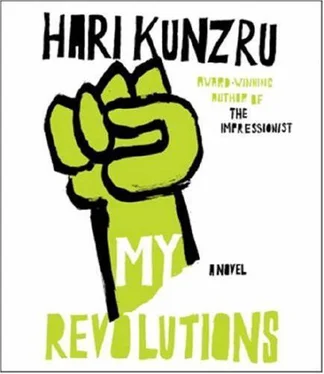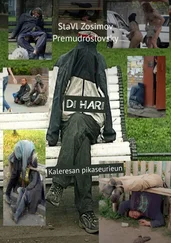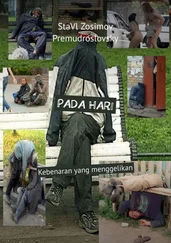She looked at me sulkily. “Right now?”
“Why not? I’m bored. I want to move.” I tried to put something jaunty into my tone, to disguise the sudden need I had to get up, to walk after the woman and see her face.
“But I haven’t finished my drink.”
I grinned a big fake grin. “All right, see you up there.”
“Christ, Mike, can’t you wait two minutes?”
“Of course. Take your time.”
I was gripped by a powerful anxiety. What would I miss if I lost sight of the woman in the straw hat? I tried to wait patiently for Miranda, then gave up. Opening my wallet, I tucked a banknote under the ashtray, scraped my chair back from the table and stood. Miranda sipped her drink with deliberate slowness. I turned around and started walking. I was halfway across the square before she caught up with me.
“You obviously didn’t want your change,” she said sarcastically. I didn’t reply.
The street that led up to the tower was steep and narrow. As we reached the church I could just see the woman up ahead, turning a corner. I walked fast, not looking behind to see if Miranda was keeping up, passing rows of identical little doorways and shuttered windows with terra-cotta flowerpots on the sills. I reached the
corner just in time to see the woman stop and fit a key into one of the doors. As she went inside, she half turned toward me. I suppressed an impulse to break into a run. She was still too far away to be sure, but I thought — it was ridiculous what I thought. Increasing my pace I approached the point where she had disappeared. Sweat was pouring off my forehead. My shirt was plastered to my back. When I judged I was outside the right door I stopped, feeling dizzy and slightly sick. The house looked newer than some of the others, but patches of its cement facing had peeled away, giving it a forlorn, down-at-heels aspect. My dizziness worsened. I couldn’t be certain, could I? I leaned forward, propping my hands on my knees.
Miranda bustled up, flushed and annoyed. “What on earth’s got into you? Are you all right?”
“I don’t feel well.”
“Sit down. Sit on the step. Why did you charge off like that?” I flopped down on the doorstep and lowered my head between my legs.
“You shouldn’t do these things,” Miranda admonished gently. “You’re no spring chicken. And in this heat—”
“Yes, all right. Don’t go on.”
“Well, excuse me .”
It couldn’t have been her. That’s all I could think. It couldn’t have been. But there was something about the way she held herself. Familiar and yet unfamiliar. I thought of my own body, letting me down after a short climb uphill. How had twenty-five years changed the way I walked, the way I swung my arms? Weakly, I allowed Miranda to help me back down to the car, where she made me drink gulps of warm plastic-bottled water. Then she drove me home.
After that, nothing was easy. In the evening, Miranda pottered about in the kitchen and I lay in the darkened bedroom, frozen into a kind of rigid panic. The next morning I felt physically better, but I couldn’t reconnect mentally with the way I’d been before we drove to Sainte-Anne. Could it really have been Anna? We went to the market and I found myself nervously scanning the crowd.
Two days went by. I was sullen, unable to settle or to enjoy anything. I’d lose myself in thought and realize Miranda had asked me a question. Several times I caught her staring at me, her jaw tight, her eyes narrowed. Our holiday was almost over and the atmosphere between us was so poisonous that, regardless of what else happened, I began to wonder whether we’d still be together when we got home. When we finally had a proper argument, I felt weirdly relieved. One minute we were preparing a tense salad in the kitchen, getting in each other’s way. The next we were standing in opposite corners of the tiny room, shouting. The content was irrelevant — I can’t even remember now what sparked it off; underneath she was telling me I was impossible and selfish and cold, and I was telling her she was controlling and stupid and shallow. I grabbed the car keys from the table and stamped downstairs. I had the excuse I needed.
The weather was cooler than before. A light wind blew dust over the road, hazing the air and moving flecks of cirrus cloud across the sky. I took the hairpins on the way up to SainteAnne-de-la-Garrigue at speed, pulling the wheel hard and sending little showers of white gravel spitting onto the crash barriers. Roaring into the village I brought the car to a halt in front of the church. Outside the Bar des Sports a group of old men were playing cards. As I got out, they stopped their game to glare at the foreigner whose loud car had disrupted the afternoon’s peace.
As I walked up the steep hill toward the tower, all I knew was that I needed to see the woman’s face; after that I hoped the rest would become clear. I’d arrived soon after lunch, earlier than before. If she had a routine, and if I waited long enough, maybe I’d see her. I was wearing dark glasses and a floppy cricket hat with a wide brim, the kind of hat that identifies its wearer as English, beyond any shadow of cultural doubt. It was supposed to be a disguise. The glasses obscured my eyes and the hat hid what was left of my hair, which when Anna had last seen me had been long and wavy.
I realized I’d begun to take seriously the possibility that it was
her. I wasn’t sure whether the chill I felt was fear or excitement.
Outside the cement-faced house, a pair of old women sat on high-backed chairs. Despite the heat they wore headscarves and pinafores and thick black stockings. A lean tabby cat rubbed round their feet, mewing. As I approached they put down their sewing and inspected me balefully. I said a gruff “ Bonjour ” and walked past, trying as I did to peer through the open door into the house. The thinner of the two, whose jaw worked in a constant nervous motion, squeezed her neighbor’s wrist and said something. The neighbor made a dismissive gesture. A little farther up the hill, I stopped. I was confused. Maybe I had the wrong house. With two pairs of eyes boring suspiciously into my back, I didn’t want to loiter around to check. The street showed no other sign of life, just a long row of closed doors and shuttered windows.
I walked back to the old women and said a second bonjour into the silence. “ La femme — la femme qui habite ici ?” I asked, gesturing at the house.
“ Une femme ?” asked the thin one, her chin quivering accusingly. I made “tall” signs with my hand. “ Ici .” I pointed to the house. “ L’Anglaise .”
The thin one spoke rapidly to her friend. They both shook their heads.
“ La Suédoise ?” suggested the friend.
“ Suédoise ?” I asked eagerly. “ Elle est suédoise ?”
They nodded warily, pursing their lips at my insistence. The thin one pointed to the next-door house.
“ Elle habite là ?” I asked. They adopted the closed expressions of respectable women who know there is a limit to the amount of information one should give a foreigner in the street. Realizing they weren’t going to reply, I thanked them and walked on.
So I’d been imagining things. The woman was Swedish, some teacher or accountant or civil servant with a holiday home in the village, and somehow from out of the depths of my stress I’d conjured Anna Addison. Relieved but inexplicably disappointed, I headed on up the hill. The street gave out into a narrow path,
bordered by a mat of dry undergrowth that made me think about snakes. Feeling like a tourist again, I stood for a few minutes, catching my breath and looking down over the roofs of Sainte-Anne. Beyond them the valley dropped away toward the glittering snail-trail of the river. I toiled on up to the tower, which was completely featureless, four blank masonry walls with no sign of an arrow slit, let alone a door. It was hard to see what it might have been used for. Around its base was a path, which I followed, trailing a hand against the warm stone. As I completed my circuit I thought I heard a man’s voice, but when I turned around to look, no one was there. It was time to go home.
Читать дальше












